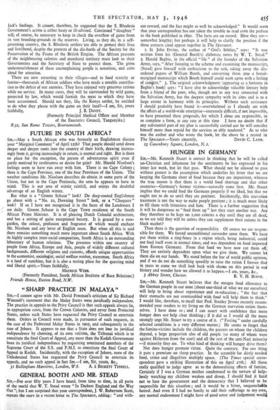GENERAL BOOTH AND MR. STEAD
SIR,—For over fifty years I have heard, from time to time, in all parts of the world that W. T. Stead wrote " In Darkest England and the :Way Out "; but I am surprised that your correspondent, J. W. Robertson Scott, repeats the story in a recent letter to The Spectator, adding: " and with-
out reward, and the fact might as well be acknowledged." It would seem that your correspondent has not taken the trouble to read even the preface to the book published in 189o. The facts are on record. Here they are— somewhat lengthy; but perhaps it will help to clarify the position if the three extracts cited appear together in The Spectator.
r. St John Ervine, the author of " God's Soldier," says: " It was written from his (General Booth's) elaborate notes by W. T. Stead." 2. Harold Begbie, in the official " life " of the founder of the Salvation Army, says, " After listening to the scheme and examining the manuscript, (Stead) gave himself with enthusiasm to the task, taking away the dis- ordered papers of William Booth, and converting them into a broad- margined manuscript which Booth himself could work upon with a feeling of comfort." 3. The original acknowledgment (appearing as a footnote in Begbie's book) says: " I have also to acknowledge valuable literary help from a friend of the poor, who, though not in any way connected with the Salvation Army, has the deepest sympathy with its aims and is to a large extent in harmony with its principles. Without such assistance I should probably have found it—overwhelmed as I already am with the affairs of a world-wide enterprise—extremely difficult, if not impossible, to have presented these proposals, for which I alone am responsible, in so complete a form, at any rate at this time I have no doubt that if any substantial part of my plan is successfully carried out he will consider himself more than repaid for the services so ably rendered." As to who was the author and who wrote the book, let the above be a record in
The Spectator.—Yours sincerely, DAVID C. LAMB. 23 Canonbury Square, London, N. r.






























 Previous page
Previous page